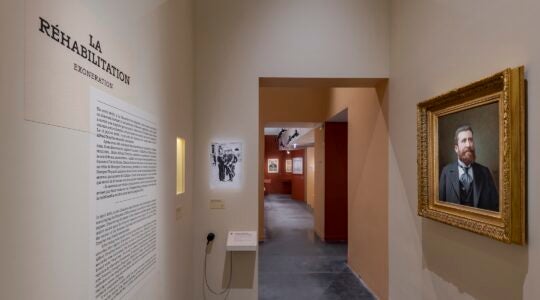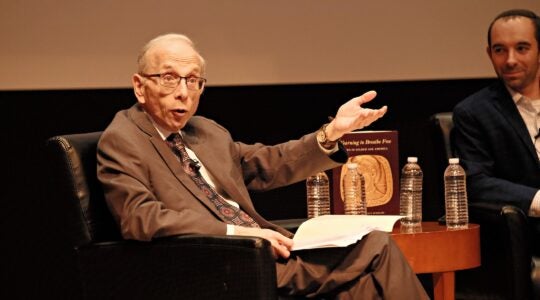During a recent interview in my office with Mark Borovitz and Harriet Rossetto, the guiding lights of Beit T’Shuvah: The House of Return, a unique community in Los Angeles that combines spiritual and psychotherapeutic approaches to addiction recovery, I became increasingly impressed with their work and their own life stories.
But that was just the start.
Rossetto, a handsome, forthright woman in her 70s, was a social worker and self-described misfit, adrift and at a low point when she found her calling in the mid-1980s, helping recently released Jewish prisoners find a place to call home and transition back into society. She believed that everyone deserves a chance at redemption.
One of those former prisoners was Borovitz, a big bear of a man whose path had veered from a middle-class Midwest Jewish upbringing to alcoholism, gambling and check fraud that landed him behind bars, twice.
Upon his release he came to Beit T’Shuvah, then a small, rundown home Rossetto had set up in a tough L.A. neighborhood, and began helping out. Over time the two became friends and eventually married. Their mutual passion — helping people recover from addiction by convincing them that each of us is flawed yet each of us matters — combined her nurturing qualities and his increasingly intense focus on bringing Jewish wisdom to broken souls.
Borovitz was ordained 12 years ago at the University of Judaism, and is now a street-savvy Conservative rabbi, preaching to an expanding community of both normative and troubled men and women.
Together, the couple’s complementary approaches to spirituality and healing have, observers say, become a remarkable success story. Beit T’Shuvah now has an $8 million campus that houses 145 residents receiving treatment for a variety of addictions — drugs, alcohol, food, sexual, etc. — through its version of the 12-step program to recovery. It also has a full-service synagogue with more than 300 people regularly attending Shabbat services; a career-training center; a music program, complete with recording studio; a traveling theater group; two thrift boutiques; and plans to construct and open an adjacent wellness center for the prevention of dependence.
But it was only when the thoroughly professional young woman accompanying Borovitz and Rossetto to the interview as director of their public relations team asked to speak that I began to understand just how special Beit T’Shuvah is.
The woman, Fanya Cohen, quietly noted: “I am two-and-a-half years sober. I didn’t know my place in the world until I came to Beit T’Shuvah.” She said she was from “a privileged background” in a Conservative Jewish family in L.A., became “addicted to perfection,” and had previously been in several “expensive treatment centers” that each had a strong profit motive.
“They would run your credit card first,” before therapy, and “tell you that in 28 days you’ll be all better.”
(Beit T’Shuvah is one of the few treatment facilities that does not turn away anyone for inability to pay. Its monthly fee is between $7,500 and $10,000, but its success in fundraising, often from wealthy families in the entertainment and business communities whose children have been helped, allows it to subsidize those who cannot afford the full fees.)
Cohen said she had needed time to understand her problem and herself, and she found it at Beit T’Shuvah, which features individualized care, with each resident spending time with a mentor and spiritual counselor, and attending Torah study every day. (About 70 percent of the residents are Jewish.)
“It took me a long time to feel safe,” she said, “but you can be yourself there and they [the staff] meet you where you are. It’s real.”
Borovitz agreed. “Most places want to fit you into a box, but we build the box around you,” he said.
The fact that Cohen, who was a resident for a year and a half, is now a key member of the professional staff is not unusual at Beit T’Shuvah. More than 80 of the 100 staff members are “graduates of the program,” as Rossetto phrases it. They include Yeshaia Blakeney, head spiritual counselor, who attended Beit T’Shuvah and got sober at 21, and Doug Rosen, director of youth services, a young producer in Beverly Hills until a cocaine habit and arrest for theft landed him in jail.
What greater message about empowerment and second chances than making former residents the heart of the professional program?
“Community is what heals,” says Borovitz. “Judaism can only be practiced in connection” with others.
He says the line between normal behavior and addiction is a thin one. “It’s 51-49, and recovery is only a 2 percent shift.”
He and Rossetto emphasize that Judaism’s wisdom is in acknowledging and accepting imperfection in everyone. They encourage residents to recognize and redirect their weaknesses and commit to doing “the next right thing.”
Rossetto, who says she comes to her Judaism from a psychological perspective, notes that an increasing number of Beit T’Shuvah residents are 18-to-25-year-olds raised in wealthy homes who are “functioned-for and overindulged” by their parents and have turned to destructive behavior. She also cites an increase in “Orthodox boys [sexually] abused in yeshivas” who use drugs to ease their pain.
Beit T’Shuvah has also dealt with rabbis with sexual addictions. Rossetto points out that charismatic figures are “particularly susceptible” since “the brighter the persona the darker the shadows.”
According to Rabbi Simkha Weintraub, rabbinic director of the Jewish Board of Family and Children Services in New York, “What’s so precious and priceless about Beit T’Shuvah is its ability to integrate a Jewish spiritual dimension” into its program. He said that offering “open-minded Torah study” is “a great gift, and obligation,” enabling people to control and manage their lives.
“Teshuvah in that sense is returning health that’s been lost,” he said.
Rabbi Ed Feinstein, spiritual leader of Valley Beth Shalom in Encino, has been a friend and mentor to Borovitz since 1990, when he worked at Camp Ramah and brought Borovitz, then fresh out of prison, to talk to the teens. “He had them transfixed for three hours,” the rabbi recalled. “So real. So much energy.”
Rabbi Feinstein says that “the amazing thing about Harriet and Mark is that they use Jewish wisdom to heal addiction, unlike other Jewish auspices.” He describes Beit T’Shuvah as “a remarkable place where you’ll find users, pushers and hookers very connected to a Jewish community” that otherwise “has no place for these people.
Many stay connected to Beit T’Shuvah as alumni, after their treatment.
“Mark is fearless in telling people the truth about themselves, and Harriet has a tremendous reputation in the therapeutic community,” the rabbi said. “For her, tikkun [repairing] is her faith.”
Rabbi Feinstein said Rossetto and Borovitz “don’t get nearly the respect they deserve in the community — until someone has a loved one who needs the program.”
Rossetto said she and Borovitz want people to appreciate that Beit T’Shuvah has become more than a rehab center. “There are many people who are hopeless,” she said, “and we offer them an infusion of hope.”
The New York Jewish Week brings you the stories behind the headlines, keeping you connected to Jewish life in New York. Help sustain the reporting you trust by donating today.





